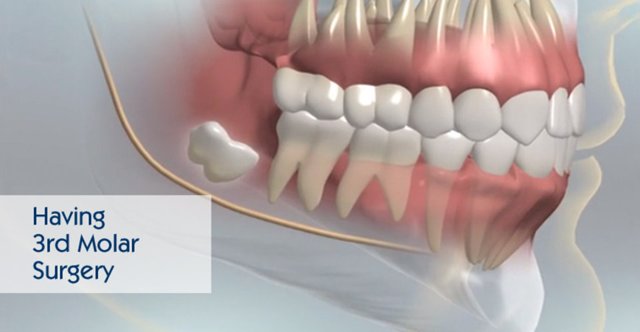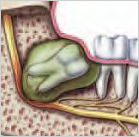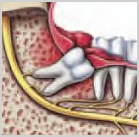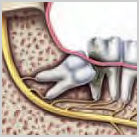Wisdom Teeth

Wisdom Teeth Management

3rd Molar Surgery
Third Molars or ‘Wisdom Teeth’ are removed to alleviate and/or prevent a wide range of problems. Because the average adult’s mouth is only able to hold 28 teeth, and the average person at 18 years of age has 32 teeth, this leads to several oral health issues that can be both painful and dangerous.
Wisdom teeth are often impacted – meaning they grow in sideways, partially emerge from the gum at an improper angle, or remain restricted beneath the gum line. Impacted wisdom teeth can lead to bacterial infections that cause patients great discomfort with swelling, stiffness, pain and even illness. They often times disrupt the natural or corrected alignment of your teeth. The most serious effect of impacted wisdom teeth left untreated is the development of tumors or cysts that grow around the impacted molar and cause severe damage to the jawbone and adjacent healthy teeth.
In our efforts to provide the highest standard of patient care, early removal of third molars is strongly recommended as the most effective means to alleviate the potential for future problems as described above.
Possible complications if not treated

FORMATION OF CYSTS

INFECTIONS

DAMAGE TO ADJACENT TEETH
What to Expect
To remove wisdom teeth that have erupted above the gum line, Dr. Hiranaka will perform a surgical extraction, under local anesthesia, on all molars to be removed. To remove wisdom teeth that are trapped below the gum line, Dr. Hiranaka will make a surgical incision in the gum tissue over each third molar to be removed and extract any bone that is covering the tooth. He will separate the tissue connecting the tooth to the bone and then remove the impacted molar.
If required to ease in extraction, Dr. Hiranaka will cut the tooth into smaller pieces to make it easier to remove, minimizing the potential for discomfort during recovery.
Recovery is usually no longer than a few days. Dr. Hiranaka will prescribe a pain medication specific to your needs for any temporary discomfort during this period.
Tips to Aid a Speedy Recovery
- Bite gently on a gauze pad periodically following surgery.
- Until the local anesthetic has worn off completely, be careful not to bite the inside of your cheek, lip, or tongue.
- Do not lay flat – this may prolong bleeding. Lay with your head elevated above your heart.
- Use an ice pack on the outside of your cheek to help manage swelling and/or discomfort for the first 24 hours.
- Physical activity is likely to increase bleeding – so REST and RELAX.
- Eat soft foods, such as oatmeal, pudding, or soup broth.
- Do not use a straw for 48-72 hours following surgery. (Sucking on a straw can loosen the blood clot and delay healing).
- After 24 hours, gently rinse your mouth with warm salt water several times a day to reduce swelling and relieve pain.
- Do not smoke for at least 24-48 hours after your surgery.
- Avoid rubbing the area with your tongue or touching it with your fingers.
- Carefully continue to brush your teeth and tongue.
have questions? Take a look at our FAQ
We also offer cosmetic services
Find out more at a-new-face.com





